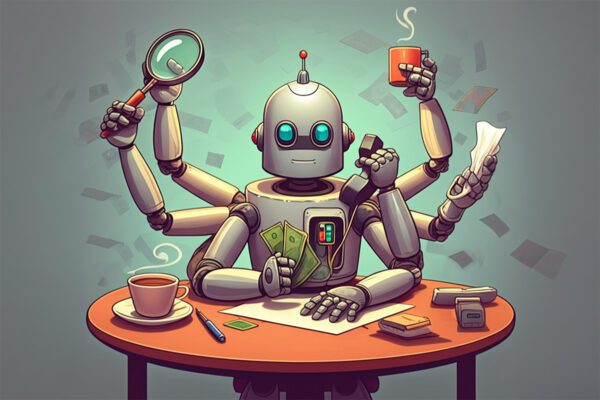It’s already a cliche to say that AI will be a game-changer for contact centers, but as many early adopters have learned the hard way, it’s not a cure-all. For all the improvements AI has already made in the world of CX, there are just as many stories of AI falling short of expectations and eroding trust in brands.
So let’s break down what AI can realistically handle today, what still requires a human touch, and how to future-proof your CX strategy by blending the best of both worlds.
What AI Can Solve in Customer Experience Today
Automating the Most Routine and Simple Tasks
One of AI’s biggest strengths lies in its ability to automate repetitive tasks. For example, AI-powered chatbots and virtual assistants can quickly handle basic customer inquiries like account status, order tracking, and product details. This not only reduces wait times but also ensures that human agents are free to tackle more complex issues. By automating the simple stuff, AI creates a more efficient workflow for both customers and agents alike.
Enhancing Self-Service
Self-service is a growing trend in customer experience, and AI is at the forefront of this shift. AI-powered systems can guide customers through FAQs, troubleshoot common problems, and even complete transactions—all without the need for human intervention. By improving self-service options, AI empowers customers to solve problems on their own, resulting in faster resolutions and increased satisfaction.
Predictive Analytics
AI can also analyze large amounts of customer data to predict needs and behaviors. By identifying patterns in purchase history, browsing habits, and past interactions, AI can personalize experiences and proactively address potential issues. For instance, AI can anticipate when a customer may need to reorder a product or offer personalized recommendations based on past purchases. This predictive capability not only improves the customer experience but also drives brand loyalty.
See how ServiceSim works in 90 seconds:
What Still Needs a Human Touch
Complex Problem-Solving
While AI excels at handling routine inquiries, it still falls short when it comes to complex problems that require creativity, critical thinking, or a deep understanding of context. Situations where customers need to explain unique issues, express frustration, or seek personalized advice are best handled by human agents. Humans are able to think on their feet, adapt to unexpected situations, and provide tailored solutions that AI cannot replicate.
Emotional Intelligence
AI can identify emotions based on words or tone of voice, but it cannot truly empathize with customers. Whether a customer is upset about a billing issue or frustrated with a product defect, human agents are better equipped to offer emotional support and respond with understanding. The emotional intelligence required to comfort an upset customer or offer sincere apologies for a mistake is something that AI simply can’t replicate—at least not yet.
Building Trust and Loyalty
Trust is at the core of any successful customer relationship. While AI can handle transactional interactions, it struggles to build long-term loyalty. Customers trust human agents to listen, understand, and act in their best interests. A personalized interaction with a real person creates a sense of connection that AI, no matter how advanced, cannot replicate. When it comes to building lasting relationships with customers, human agents will always play an essential role.
How to Future-Proof Your CX Strategy
Invest in Hybrid Solutions
The future of customer experience lies in the integration of AI and human agents. AI can handle routine tasks and streamline processes, while human agents can focus on more complex, nuanced interactions. By creating a hybrid solution, businesses can optimize both efficiency and personalization. AI-powered tools can free up human agents to engage in high-value tasks, creating a seamless experience for customers.
Continuous Learning for AI
For AI to truly excel in customer service, it needs constant learning and refinement. AI systems should be regularly updated with new data, algorithms, and feedback to ensure they stay relevant and effective. By investing in AI that continuously evolves, businesses can improve their contact center’s performance and adapt to changing customer needs.
Focus on Customer-Centricity
Regardless of how advanced AI becomes, the ultimate goal of any CX strategy should be to delight the customer. AI should serve to enhance the human experience, not replace it. A customer-centric approach involves understanding the unique needs of each individual and tailoring interactions to suit those needs. By combining AI’s capabilities with human empathy and insight, businesses can create an experience that’s both efficient and deeply personal.
AI is undoubtedly transforming customer experience, but it’s important to recognize its limitations. The key to a successful CX strategy is not relying solely on AI or human agents, but integrating both to create a more efficient, personalized experience. By understanding what AI can do today, what still requires a human touch, and how to blend the two, businesses can future-proof their CX strategies and deliver exceptional service.
At Vistio, we believe that the future of customer experience isn’t about choosing between AI and humans—it’s about finding the perfect balance. Ready to future-proof your CX strategy? Let’s talk.
Want to Try ServiceSim free?
Visit the ServiceSim listing on Microsoft’s Azure Marketplace

SUBSCRIBE FOR EMAIL UPDATES

